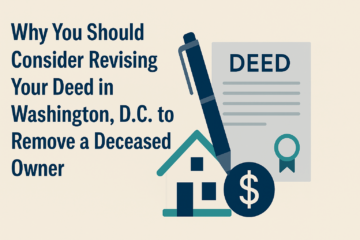When a property is transferred through an estate deed of distribution, determining the correct tax basis is critical for the heirs or beneficiaries. Understanding the basis for an estate deed is essential for calculating any capital gains when the property is eventually sold. Let’s walk through how you determine the basis of a property transferred through an estate and why it matters.
What is a Property’s Basis?
In real estate, the “basis” refers to the value used to determine capital gains or losses when the property is sold. For inherited property, the basis is typically the fair market value (FMV) at the time of the decedent’s death. This means that even if the decedent purchased the property for significantly less, the beneficiaries inherit the property at its FMV, which may be higher or lower than the original purchase price.
Determining the Basis
- Date of Death and Fair Market Value (FMV): The first step in determining the basis is identifying the date of the decedent’s death. The property’s value at this time typically becomes its new basis for the beneficiaries. This is often referred to as a “stepped-up” or “stepped-down” basis.
- Getting a Property Appraisal
To determine the FMV, an appraisal of the property as of the date of death is required. A professional appraiser will examine various factors, such as comparable property sales, location, and property condition, to assess its value accurately. This FMV is crucial for both tax reporting and future capital gains calculations. - Stepped-Up or Stepped-Down Basis
- Stepped-Up Basis: If the property has appreciated since the decedent purchased it, the heirs inherit the property at its higher FMV. For instance, if the decedent originally bought the property for $100,000 but it was worth $300,000 at the time of death, the new basis is $300,000.
- Stepped-Down Basis: Conversely, if the property has decreased in value, the new basis will reflect the lower FMV. So, if the property was worth $80,000 at the time of death, the beneficiaries will inherit it at that lower value, even if the decedent paid more.
- Alternate Valuation Date Option
In some cases, the estate might elect to use an “alternate valuation date,” which is six months after the decedent’s death. If the alternate valuation is chosen, the property’s FMV on that date becomes the new basis. This option is typically used if the property’s value has significantly changed during those six months. - Adjustments to Basis
The basis of the property can also be adjusted for any improvements or capital expenditures made by the estate before distributing the property to the heirs. These improvements increase the property’s basis and may reduce capital gains taxes when the property is sold. - Special Considerations for Inherited Property
It’s important to note that there are exceptions and special rules in certain cases, such as when the property is held as part of a community property estate or joint tenancy. Working with an experienced attorney or tax advisor ensures the correct basis is applied for estate planning and tax purposes.
Why Does the Property’s Basis Matter?
Understanding the property’s basis is critical because it determines the taxable gain when the property is sold. If a beneficiary inherits a property with a stepped-up basis to the FMV, they may avoid significant capital gains taxes, especially if they sell the property shortly after inheriting it. Conversely, a stepped-down basis might result in higher taxes upon sale if the property’s value increases in the future.
Final Thoughts
The process of determining the basis for an inherited property can seem complex, but it is essential for tax planning and compliance. Whether the property appreciates or depreciates, ensuring you have an accurate appraisal and understand any adjustments is key.
The content of this blog is for informational purposes only and does not constitute legal advice. Reading or interacting with this material does not create an attorney-client relationship with Gentile Property Law Office, LLC. For specific legal advice, please contact our office.



0 Comments